Conclusion
We have put the new Netac NV7000-Q 1TB PCIe Gen4 x4 M.2 2280 NVMe SSD through its paces in system benchmarks, throughput benchmarks, game loading benchmarks, file copy benchmarks, and workstation benchmarks. Netac is launching the NV7000-Q worldwide, and in the US market soon with a pricing of around $79 for the one and only 1TB model at this time, though pricing is not solidified exactly just yet, so watch this space. It is unclear if there will be higher capacities in the future, though there is certainly room on the PCB for that possibility.
The Netac NV7000-Q 1TB PCIe Gen4 x4 NVMe SSD is a QLC (4-bit per cell) SSD in Netac’s NV7000 SSD lineup. It sits in the same product stack as the NV7000-t and NV7000 models. Based on the 4-channel Maxio MAP1602 controller and YMTC 232-Layer QLC 3D NAND flash this DRAM-less SSD is poised to provide a value option for PCIe 4.0 Gen4 x4 7GB/s throughput performance in the NVMe SSD space from Netac.
The Netac NV7000-Q has a sequential read speed of 7,100MB/s and a sequential write speed of 6,200MB/s. With Host Memory Buffer support and an SLC cache, along with high-speed 2400MT/s QLC 3D NAND flash it has an improved endurance of 640 TBW. It is aimed at providing enthusiast-level performance in a compact and slim cool running profile.
Cooling
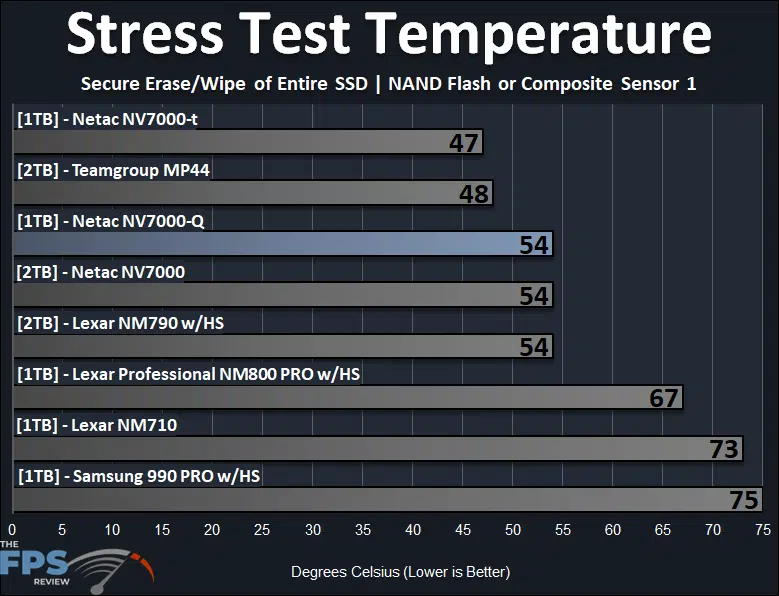
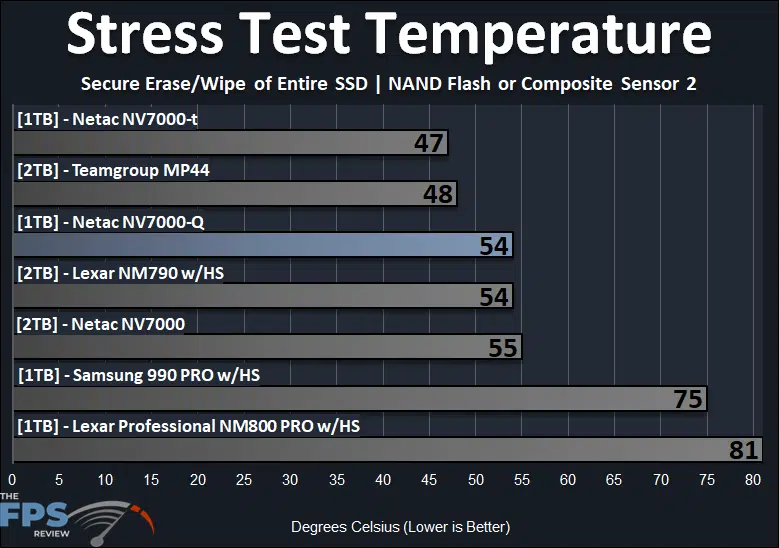
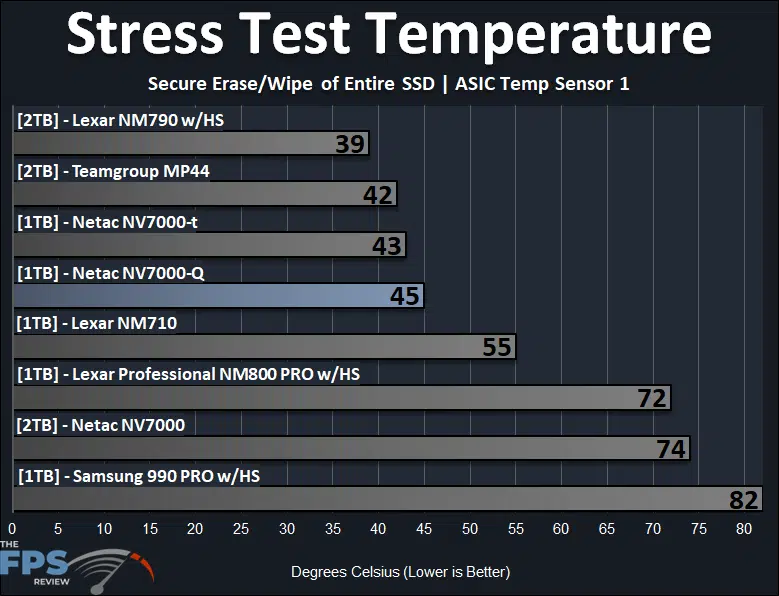
The goal of this temperature testing is to push the SSDs as hard as possible by writing to the SSD over the entire capacity using Secure Erase/Wipe feature. This is not typical usage behavior, but our goal is to find the maximum limits of the cooling in use and to see if it can keep up with a high demand of usage without adding external fans. We utilize HWiNFO64 for reporting SSD temperatures, taking note of all sensor data, either the (NAND Flash or Composite Sensor) or the (ASIC) sensor. We report what this utility shows us. No case fans are running during these tests.
This is where the thermal behavior and low power utilization of the Maxio MAP1602 shines through. The Netac NV7000-Q 1TB PCIe Gen4x4 NVMe SSD results in very low temperatures utilizing the thin heat spreader Netac has in place. For these tests we do not have any active fans over the SSD, it is operating without any third-party or motherboard heatsinks attached.
The NAND Flash or Composite Sensor temperature reading was just 54c, running just as cool as the NV7000 with a much larger and heavier aluminum heatsink in place. The Netac NV7000-Q was running warmer than the Netac NV7000-t, however, which has a similar heat spreader. Looking at the ASIC Temp Sensor the Netac NV7000-Q was running a lot cooler than the NV7000, it was actually a huge amount at 29 degrees difference. The Netac NV7000-Q was on par with the temperatures of the Netac NV7000-t ASIC, which utilizes the same Maxio MAP1602 controller.
Netac SSD Toolbox
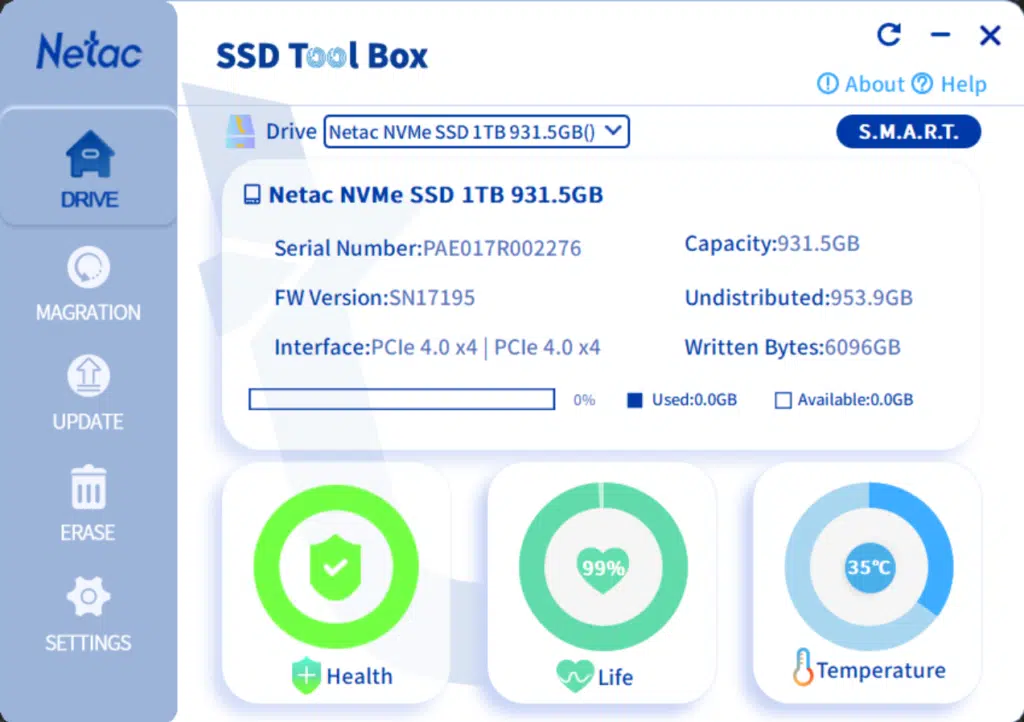
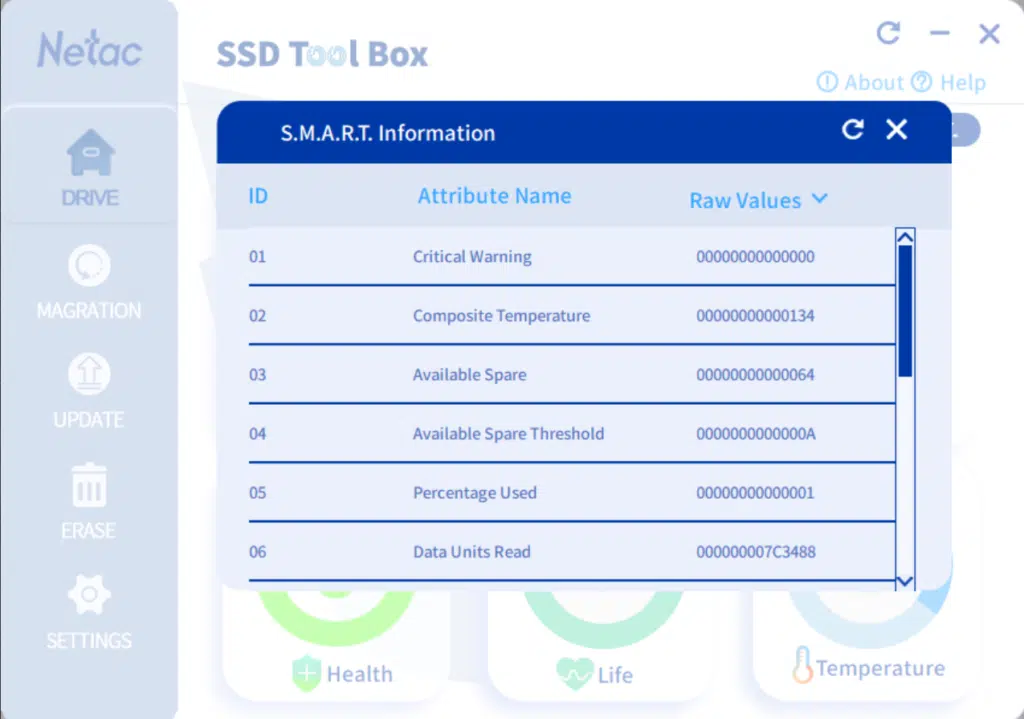
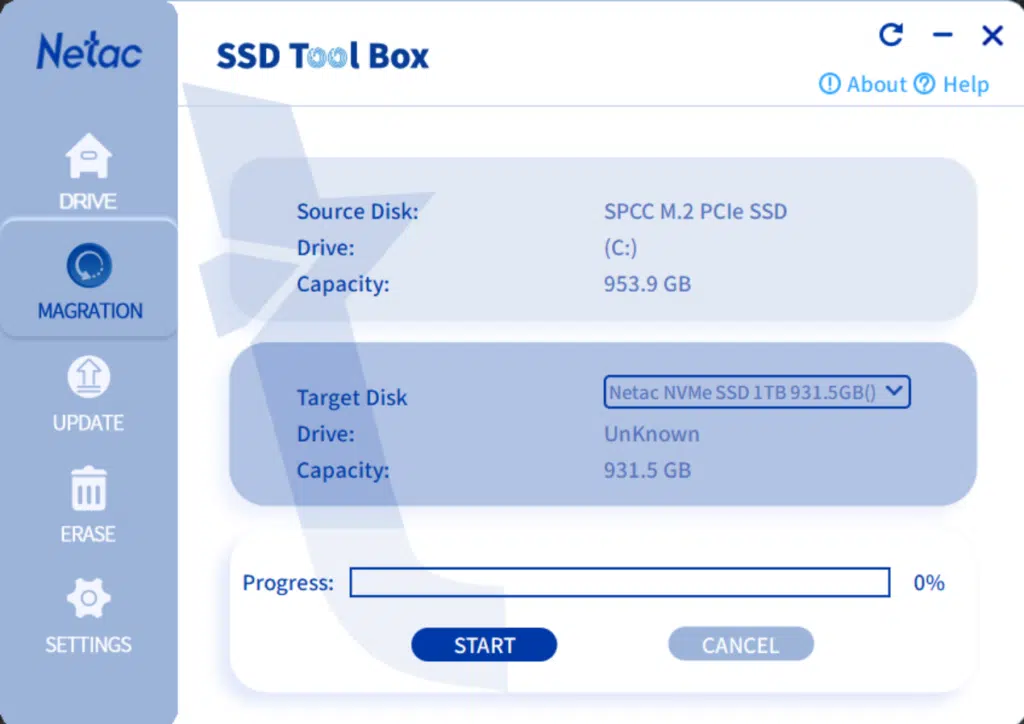
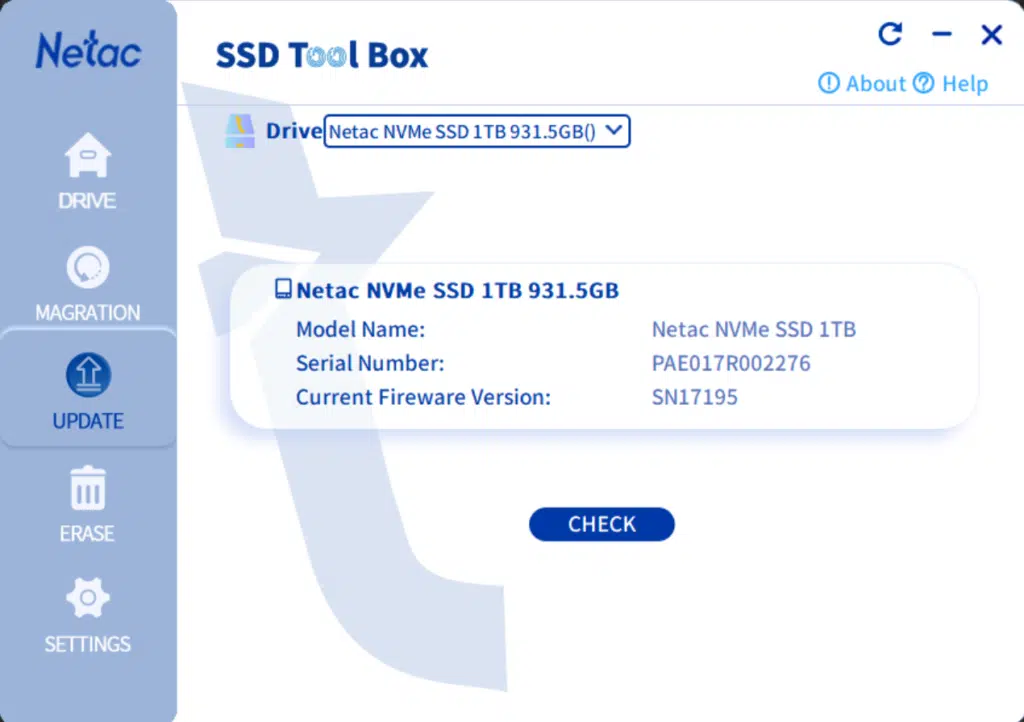
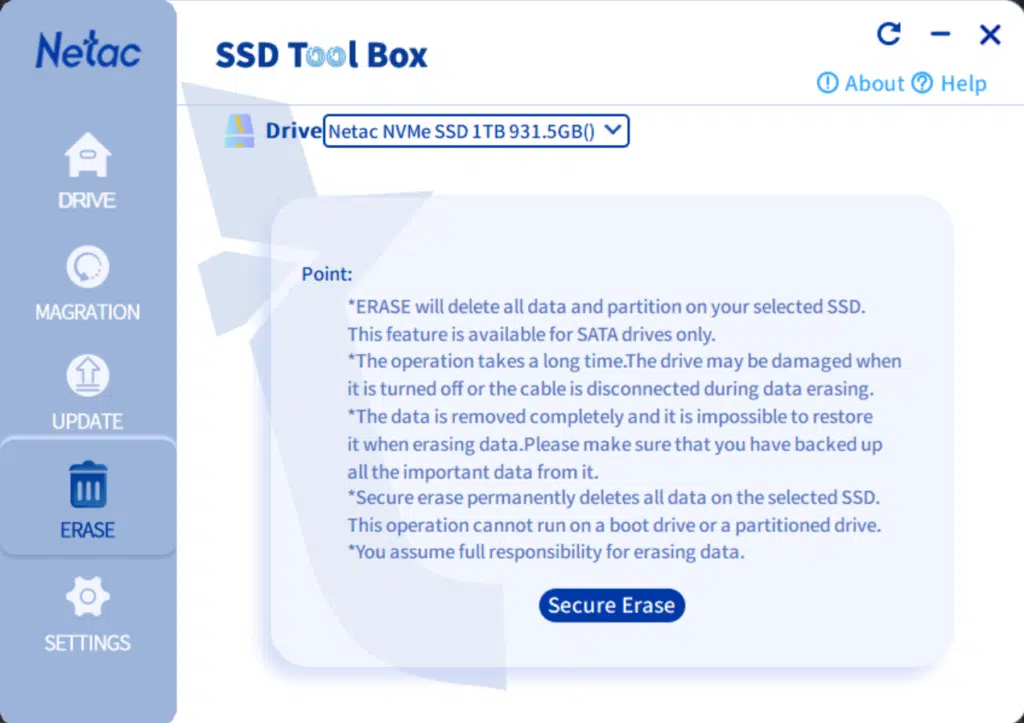
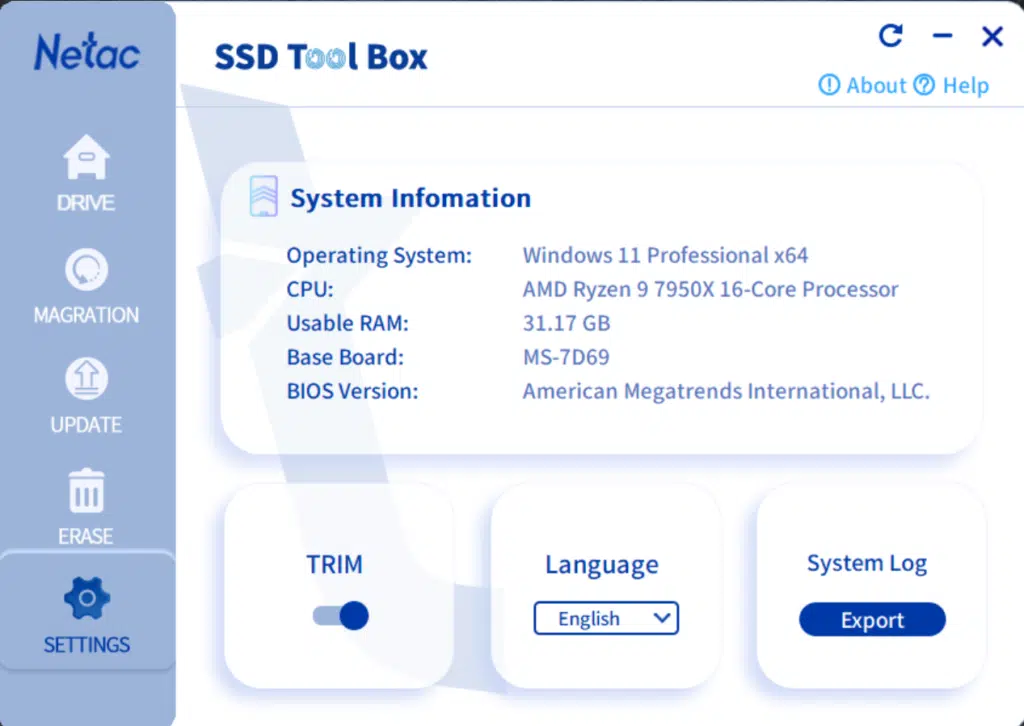
Netac has SSD Toolbox software, and we can do important things like monitor drive health, drive life remaining temperature, and S.M.A.R.T. data. All of these things are important for an SSD, and it is very nice that this functionality exists. Netac also offers the ability to check for new firmware and update firmware on the SSD, an important feature to have. Netac also goes further and provides migration support built into the software. You can easily clone one SSD to another on the same computer with the push of a button, it is just easily done. It also has a Secure Erase feature.
Final Points
The Netac Netac NV7000-Q 1TB PCIe Gen4 x4 NVMe SSD is generally a competitive SSD for everyday tasks or gaming. In our testing, the Netac NV7000-Q reached its advertised goals and performed as expected. That is to say, it reached that threshold of the latest PCIe 4.0 Gen4 SSDs of up to 7GB/s sequential read performance, and 6GB/s sequential write performance.
In throughput, it performed well in read and write sequential performance and random read performance. It fell behind in random write performance compared to other competitive TLC-based SSDs, but not so far behind that it made a noticeable difference in use.
QLC
There is a stigma regarding QLC (4-bit per cell) SSDs in terms of endurance. In the past, this has been very true, typically with QLC drives having fewer P/E cycles. However, with the use of YMTC Xtacking 3D NAND flash a lot of those concerns about performance and endurance are lessened. With the 3D NAND flash running at a higher throughput, it is able to produce competitive PCIe 4.0 Gen4 performance at a value price. In addition, YMTC has taken painstaking measures to increase P/E cycles with its latest QLC 3D NAND Xtacking technology.
With an endurance rating of 640 TBW, it matches the Netac NV7000-t for endurance, which is a TLC-based SSD. It is not far from the endurance rating of the NV7000 either. Yes, there are other TLC-based SSDs with much higher endurance ratings and P/E cycles, QLC will always have a disadvantage in this area, but a lot of headroom has been made with the latest YMTC 3D NAND flash that is in use here. Still, if you are after the best endurance, you will want to look toward other TLC-based solutions.
In terms of QLC performance, the Netac NV7000-Q shows one disadvantage of performance in our Steam Library file transfer. Once the buffers fill up, the performance tanks down to spinning hard drive performance, it can definitely happen. However, for that to happen you will have to be writing enormously large files that are practically a quarter the size of the entire SSD’s max capacity itself. If you are a content creator working with very large files, this may not be the SSD for you. The Netac NV7000-Q will work fine if you are a casual or light content creator, as well as casual work, and gaming. You will not run into those bottlenecks with lighter workloads.
Pricing
When looking at what the Netac NV7000-Q offers, it will all come down to pricing as this SSD is meant as a value option, yet poised to retain PCIe 4.0 Gen4x4 performance. Right now on Amazon, the Netac NV7000 1TB is $83 and the Netac NV7000-t 1TB is $77 at the time of writing. Granted, these SSDs have been out for 1 or 2 years, but availability is good and pricing is lower now, and it could change over time.
The Netac NV7000-Q 1TB is reported to launch in the US for around $79, though this is not solidified yet at the time of this writing as the SSD is not yet available in the US. If it launches at this pricing, it will be hard to justify when compared to the Netac NV7000-t which generally has better performance and is a TLC-based drive.
Therefore, everything will ride on the US pricing of the Netac NV7000-Q when this becomes available. We suggest making sure to check pricing online regularly to see where it lands, and where it sticks in comparison to what is available at the time. From this review, you should now know where it lines up in performance against the NV7000-t and other SSDs and will be able to make an informed buying decision based on that pricing when it is available.
Summary
Overall, the Netac NV7000-Q performs well being a QLC-based SSD, providing competitive PCIe 4.0 Gen4 x4 throughput in sequential performance, only falling behind in random write performance. It isn’t going to beat the fastest TLC-based SSDs on performance, but it does come close to the Netac NV7000-t a lot of the time. Except in one scenario, where the Netac NV7000-Q will fall flat on its face, in very large file-size workloads.
The Netac NV7000-Q also has a decent and competitive endurance being a QLC-based SSD. It matches the endurance of the Netac NV7000-t. However, once again it isn’t going to beat the highest endurance ratings on TLC-based SSDs that exist out there, some with double the endurance even. It is still exciting to see QLC reach this level of endurance, it is certainly an improvement over past generations of QLC SSDs.
The Netac NV7000-Q also comes in a compact and slim profile, able to fit in laptops and small form factor PCs, and the PS5, easily without the need for installing a large heatsink. It runs cool and performant for the profile and that should open it up to more possibilities for installation.
Keep an eye on the pricing when the Netac NV7000-Q SSD comes to market in the US, as pricing will be everything. If it is priced right, the Netac NV7000-Q could be a good value-based SSD for mobile, work, or gaming.
